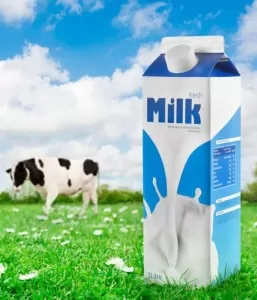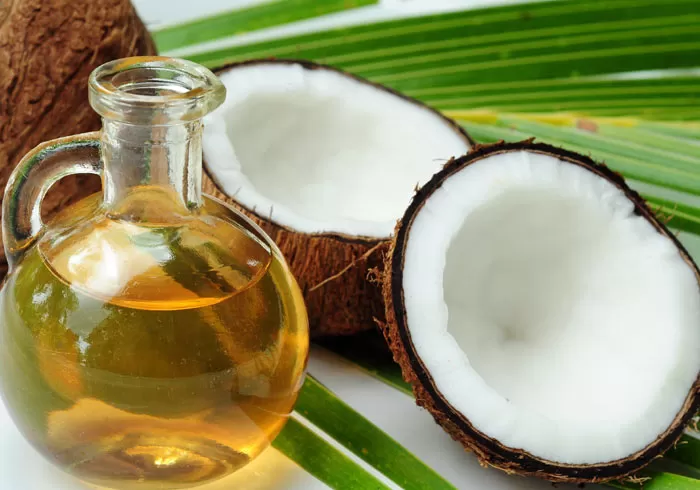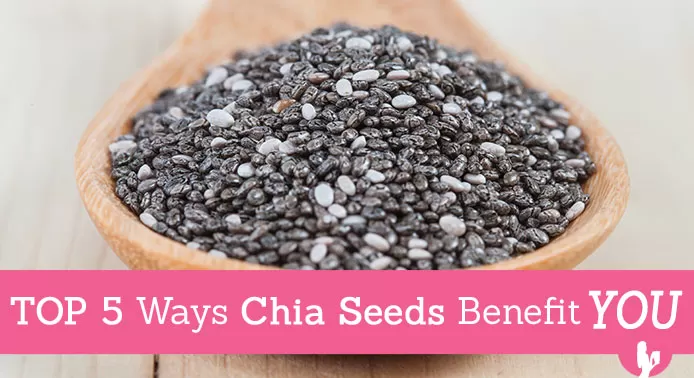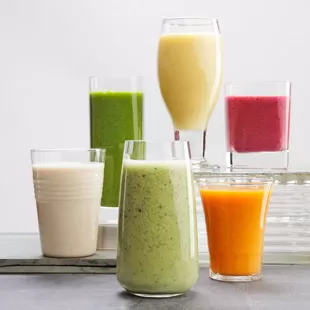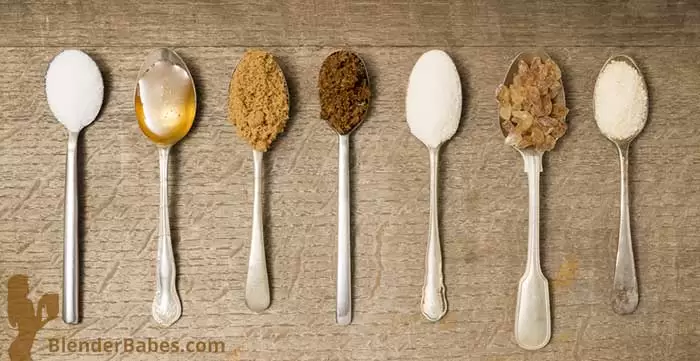These days, people aren’t limited to drinking just cow’s milk. There are many reasons for moving away from traditional dairy. People who follow a Primal or Paleo lifestyle, vegans and some vegetarians, and Lactose intolerant folks typically avoid dairy, and especially milk. Even people without dietary restrictions are moving towards using milk substitutes, especially as more and more studies are suggesting that perhaps cow’s milk isn’t the healthiest option. Some are concerned about America’s industrial production of dairy, including pasteurization, others are worried about added hormones and the ethical treatment of dairy cows. Still others believe that cow’s milk, no matter how ethically produced, has adverse health effects on children and adults.
Whatever your reasons, Blender Babes gives you a guide to cow’s milk and the substitute milk options on the market today.
[socialpoll id=”10187″]
Dairy Cow Milk
In our language and our lives, it seems milk has always been there. For years, we’ve been told it is part of a healthy, balanced diet and NECESSARY for strong bones, hair, teeth and nails. Now, we can choose to buy milk that is pasteurized, organic, whole or skim.
So, does milk do a body good?
According to the “National Dairy Council” milk is filled with nine essential nutrients that benefit our health:
- Calcium: Builds healthy bones and teeth; maintains bone mass
- Protein: Serves as a source of energy; builds/repairs muscle tissue
- Potassium: Helps maintain a healthy blood pressure
- Phosphorus: Helps strengthen bones and generate energy
- Vitamin D: Helps maintain bones
- Vitamin B12: Maintains healthy red blood cells and nerve tissue
- Vitamin A: Maintains the immune system; helps maintain normal vision and skin
- Riboflavin (B2): Converts food into energy
- Niacin: Metabolizes sugars and fatty acids
It is clear that milk has nutritional value.
That said, there have been studies that show animal protein, including in milk, can be cancer causing (have you seen Forks Over Knives yet?). It has been linked to IDDM [insulin-dependent diabetes mellitus in children]. Also, milk and dairy products can reduce a child’s ability to absorb iron. Combined with the fact that milk has virtually no iron of its own, the result is an increased risk of iron deficiency.
Several studies have been published showing a high positive correlation between milk consumption in different countries and rates of death a few years later from CHD [Coronary Heart Disease]. One investigation showed that countries which reduced milk consumption later had reduced rates of CHD death, while the only country studied which increased its milk consumption [Portugal] had an increased rate of CHD death.
So, what are your options if you wish to consume LESS (or no) dairy?While rice, soy, hemp, coconut and almond milk make acceptable milk substitutes for vegans, vegetarians and those with lactose intolerance, casein or gluten allergies, there’s a world of difference between these milk substitutes. Read on to find out which is better for YOU.
Rice Milk
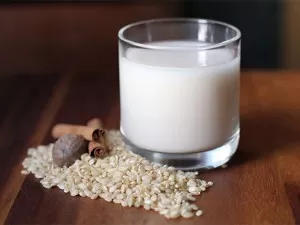
Rice milk contains no animal products, so it’s appropriate for vegans and vegetarians. Because rice milk contains no lactose, it can be safely consumed by those who are lactose intolerant. Rice milk is also very low in calories and fat; it contains just three grams of fat per serving and about 140 calories per serving. Learn how to make your own rice milk with a Blendtec or Vitamix blender!
We recommend supplementing your diet with other sources of protein and calcium if you use rice milk exclusively. Also, due to the recent arsenic in rice scare, you may want to avoid rice products including rice milk.
Almond Milk
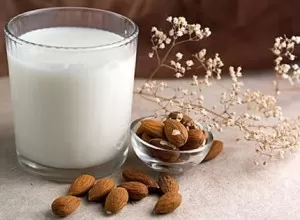
Almond milk, unlike rice milk, contains a range of essential vitamins and minerals, including magnesium, selenium, manganese, potassium, fiber, iron, zinc, phosphorous, calcium and vitamin E. Because of the high levels of vitamins and minerals that occur naturally in almonds and almond milk, almond milk has been approved for schools, and manufacturers do not need to fortify it.
Almond milk’s higher nutritional value means that it has more health benefits than rice milk. The high levels of antioxidant vitamin E in almond milk make it effective in the prevention of cancer and can slow the signs of aging. Because almond milk is lactose and casein free, it’s appropriate for the lactose intolerant and those with gluten allergies. Vegans and vegetarians like that almond milk doesn’t contain animal products.
Store bought almond milk is even lower than rice milk in calories, at just 40 calories per serving, but contains about the same amount of fat, three grams per serving. Homemade almond milk is 118 calories per cup, is full of healthy fats and is high in antioxidants, vitamins and minerals. We prefer its flavor over rice milk.
Soy Milk
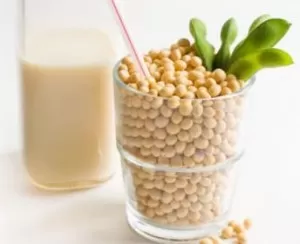
Studies investigating soy’s role in breast cancer have yielded mixed results. Some findings suggest a substance in soy acts as a hormone in breast cells, fueling increased cancer risk.
However, The American Academy of Pediatrics has deemed soy milk a suitable alternative for children who cannot tolerate human or cow’s milk, or whose parents opt for a vegan diet. When we make soy milk using a high powered blender, we always opt for the non-GMO organic soybeans.
Hemp Milk
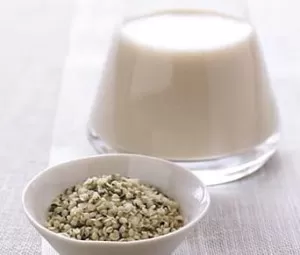
Hemp seeds have a rich, nutty flavor, which can be detected in the milk. The milk is made by pulverizing the seeds with water, and straining out any solid residue.
One of things Blender Babes LOVES about Hemp milk, is it contains omega-6 and omega-3 essential fatty acids in a healthy three-to-one ratio. Other nutrients found in hemp milk are magnesium, phytosterols, ascorbic acid, beta-carotene, calcium, fiber, iron, potassium, phosphorus, riboflavin, niacin and thiamin.
“Because hemp milk also contains 10 essential amino acids, it is a good option for vegetarians. However, according to the manufacturer of one brand of the milk, hemp protein does not contain phytates, enzyme inhibitors found in some soy protein that can interfere with the assimilation of essential minerals. The same manufacturer maintains that hemp protein is more digestible than soy protein because unlike soy, it contains no oligosaccharides, complex sugars that can cause flatulence if not properly broken down during digestion.” Dr. Weil
Well Dr. Weil, we don’t know about you but the less “flatulence” the better – so we’ll stick with Hemp over Soy milk… 😉
Coconut Milk
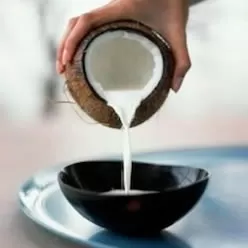
Keep in mind, coconut milk is not a low calorie food. It’s high in saturated fatty acids and medium-chain triglycerides (MCT), which are both easily burned as fuel by the body. MCTs are particularly beneficial in that they don’t require bile acids for digestion, and they’re directly shunted to the liver via the portal vein. If this is your milk of choice, you will just have to make sure you get some exercise! Of course, a healthy Blender Babe knows this and makes the time to be good to themselves! 🙂

